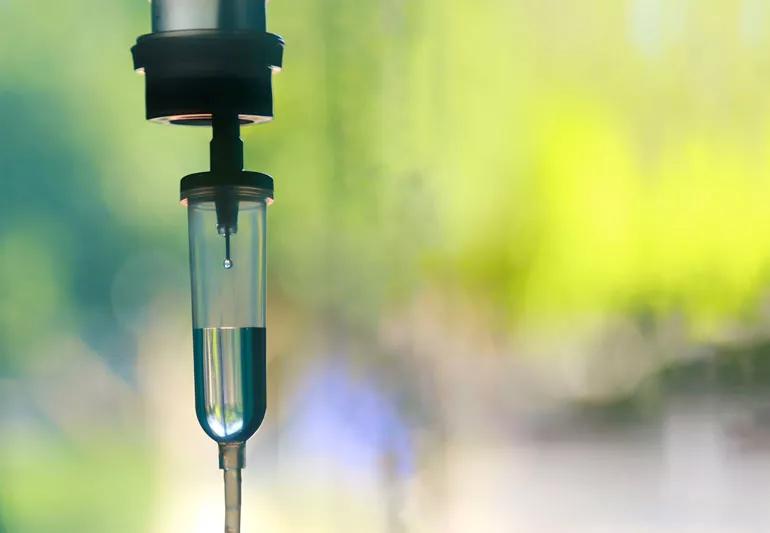Total parenteral nutrition needed for some patients

For most of us, the smell of our favorite meal cooking on the stove is one of the greatest joys in life. But for some people, solid foods simply aren’t even an option.
Advertisement
Cleveland Clinic is a non-profit academic medical center. Advertising on our site helps support our mission. We do not endorse non-Cleveland Clinic products or services. Policy
Approximately 30,000-35,000 people in the U.S. rely solely on intravenous fluids (IV) to meet their caloric and nutritional needs. It’s not a diet trend by any means. It is a prescribed treatment for people with certain illnesses to get the essential nutrition they need.
This therapy is known as total parenteral nutrition (TPN) says gastroenterologist and nutrition specialist Donald Kirby, MD. Any number of conditions can lead to surgery that make it necessary, such as Crohn’s Disease, bowel obstruction, congenitally shortened intestines, or vascular disease that causes gangrene intestines.
“It’s hard to imagine not being able to enjoy food the way you’d like to, or have the ability to satisfy your food or taste cravings,” he says. “But if you require TPN therapy your digestive tract can’t absorb nutrients properly, so it’s the only option you may have.”
Depending on your diagnosis, you may be able to eat and absorb some nutrients. So eating small amounts may be possible in some cases. But for a lot of patients, receiving nutrients through an IV may be the only option.
In fact, some patients may also be advised to stop drinking fluids, too, because they’re more likely to use up more fluid processing the liquids than what they actually take in — which can lead to dehydration.
Advertisement
“When you’re required to limit what you ingest through your mouth mouth partially or entirely, you’re forced to think about nutrition in a completely different way,” Dr. Kirby adds. “It can be a big lifestyle change, but you can do it.”
TPN is comprised of proteins, carbohydrates, fats and various water-soluble and fat-soluble vitamins, as well as electrolytes, essential fatty acids and trace elements, such as zinc and copper. Your body needs them all to work properly.
There’s still a chance you’ll feel hungry, though, Dr. Kirby says, at least initially.
“My colleagues and I usually hear hunger complaints when someone first starts TPN because they’re not getting that feeling of satiety from a full stomach,” he says. “This can ease over time. Other patients might experience more nausea than hunger if an obstruction (blockage) is preventing them from eating.”
There are other side effects to watch for: mouth sores, skin changes and poor night vision. These are not side effects of TPN but are possible signs of malnutrition or vitamin deficiency that may result from it. If you have fever, stomach pain, swelling, muscle weakness, vomiting or seizures, call your doctor.
Most people on TPN are able to maintain their normal daily activities, Dr. Kirby says.
“As long as TPN provides enough calories, patients have the energy and endurance to do the things they want,” he adds. “They’re usually tired right after surgery or hospitalization, but they rebound and do a lot better.”
TPN infusions must stay refrigerated, and they’re delivered through a special IV catheter placed either in your chest or arm. Typically, the fluid bag hangs from an IV pole next to your bed. Backpacks are also provided (to hold the infusion pump and TPN bag) so that patients can be mobile while infusing, especially if they infuse during the day.
Your small intestine’s absorption ability determines how much fluid you’ll need. Some patients need two liters of fluid nightly while others need only a liter three to four nights a week.
How long you’ll need TPN therapy also varies, Dr. Kirby says.
“Much depends on your underlying condition. A lot of people with malabsorption due to short bowels or a temporary blockage can come off TPN,” he says.
For many, it’s three to 12 months of therapy where the amount of TPN needed reduces over time. Your body adapts fully to surgery after about one to two years and people are usually able to reduce how much TPN they’re dependent on.
Infusion pharmacies will typically deliver seven nights’ worth of TPN weekly with supplies that include an infusion pump and tubing to connect the TPN to the IV catheter.
Advertisement
Some pharmacies also provide separate refrigerators to store infusion additives, such as multi-vitamins or insulin. Backpacks with battery pumps are available for patients who prefer daytime infusions.
There are a lot of options available, so talk to your doctor to find the right supply program for you, Dr. Kirby says.
Advertisement
Learn more about our editorial process.
Advertisement
There’s not one specific cure-all diet for eczema, but it helps to keep track of what you eat and when you experience symptoms

This starchy root vegetable is a staple in many global cuisines — but it has to be prepared correctly, or it can cause serious concerns

These delicate green sprouts can give you an extra dose of vitamin K and other nutrients — but they’re not safe for everyone

Edamame, lentils and chicken breast are good sources of protein

This powerful antioxidant does more than fight colds — it keeps you healthy inside and out

Eating this root vegetable can help support your eye, heart and brain health

The flavorful herb is full of antioxidants that may help regulate blood sugar

Too much sodium can cause high blood pressure and increase your risk of heart disease

Start having sex about 72 hours before ovulation, then at least every other day during your fertile window

Attachment theory suggests that your earliest relationships shape connections throughout your life

It isn’t a recognized mental health disorder, but research shows that problematic social media use can negatively affect your mental health, self-esteem and sleep